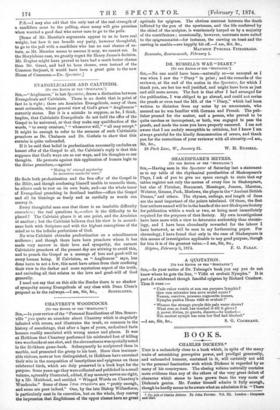EVANGELICALISM AND CALVINISM.
[TO THE EDITOR OF THE " SPECTATOR.")
Sin,—' Anglicanus," in last Spectator, draws a distinction between Evangelicals and Calvinists. There is no doubt that in point of fact he is right ; there are Arminian Evangelicals, many of them most estimable, whose general view of God's grace " Anglicanus" correctly states. But it is a mistake to suppose, as he, I think, implies, that Calvinistic Evangelicals do not hold the offer of the Gospel to be universal, or that they make any qualification of the words, "to every creature," "whosoever will," "all may accept." It might be enough to refer to the sermons of such Calvinistic preachers as Dr. Chalmers and Dr. Guthrie to show that this surmise is quite unfounded.
If it be said that belief in predestination necessarily excludes an honest offer of the Gospel to all, the Calvinist's reply is that this supposes that God's ways are as our ways, and his thoughts as our thoughts. He protests against this application of human logic to the divine procedure,—against
"Meting th' eternal mysteries In measures made for man."
He finds both predestination and the free offer of the Gospel in the Bible, and though confessing himself unable to reconcile them, he allows each to rest on its own basis, and—as the whole tenor of Evangelical preaching in Scotland testifies—offers the Gospel and all its blessings as freely and as cordially as words can convey it.
Every thoughtful man sees that there is an insoluble difficulty
somewhere ; the real questions is,—where is the difficulty to be placed ? The Calvinist places it at one point, and the Arminian at another ; but the Calvinist believes that his view is in accord- ance both with Scripture and with the highest conceptions of the mind as to the infinite perfections of God.
No wise Calvinist obtrudes predestination on a miscellaneous audience ; and though there have been preachers whom it has made very narrow in their love and sympathy, the earnest Calvinistic preachers of the present day are striving to avoid this, and to preach the Gospel as a message of love and good-will to every human being. If Calvinism, as " Anglicanus " says, has done harm to not a few, this must have arisen from their confining their view to the darker and more mysterious aspect of the truth, and excluding all that relates to the love and good-will of God generally.
I need not say that on this side the Border there is no shadow of sympathy among Evangelicals of any class with Dean Close's
proposal as to the railways.—I am, Sir, &c., SCOTICANUS.


































 Previous page
Previous page